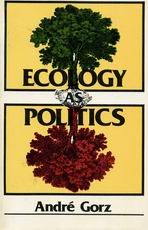

|
|

Ecology as Politics
Gorz, Andre
Publisher: Black Rose Press, Montreal, CanadaYear Published: 1980 Pages: 215pp ISBN: 0-919618-72-3 Library of Congress Number: HD83.G6713 Dewey: 304.2 Resource Type: Book Cx Number: CX7397 Socialism is no better than capitalism if it makes use of the same tools. The total domination of nature inevitably entails a domination of people by the techniques of domination. Abstract: Gorz's book attempts to connect the ideas of ecology and socialism to reach the goals of both and take society off its current path. It is a visionary plan to preserve the Earth and to create a community that supports all citizens. Every aspect of such a society is considered, including the implications for freedom, work conditions, energy sources, and health care. The goal is to create a Utopia in a developed world that does not exhaust the Earth's natural resources, while overcoming problems such as class conflict, overpopulation, and poverty. Gorz has a clear vision for how the future can be improved and has provided a blueprint for realizing it. This volume is divided into four parts, excluding the introduction and epilogue. Part 1: Ecology and Freedom discusses the ties between ecological sustainability and democratic socialism. Part 2: Ecology and Society talks about the necessity for change to prevent overpopulation and depletion of natural resources. Part 3: The Logic of Tools introduces questions regarding the political debate over nuclear power, and leans toward other renewable energy sources. Part 4: Medicine, Health and Society proposes a socialist health care system, much like the public health care in Canada. The conclusion calls for a revolution, the first step to which would be recognition that a country belongs to its people, and it is the people who must work from the bottom up to transform it. [Abstract by Mia Manns] Table of Contents Introduction: Two Kinds of Ecology Part I. Ecology and Freedom 1. Ecological Realism 2. Political Economy and Ecology: Marx and Illich 3. Ecology and the Inversion of Tools 4. Ecology and the Crisis of Capitalism 5. The Poverty of Affluence 6. Equality and Difference 7. Social Self-Regulation and Regulation from Outside 8. Seven Theses by Way of Conclusion 9. A Possible Utopia Part II. Ecology and Society 1. Reinventing the Future 2. Affluence Dooms Itself 3. The Social Ideology of the Motorcar 4. Socialism or Ecofascism 5. Twelve Billion People? Part III. The Logic of Tools 1. Nuclear Energy: A Preeminently Political Choice 2. From Nuclear Electricity to Electric Fascism 3. Boundless Imperialism: The Multinationals 4. Labour and the "Quality of Life" Part IV. Medicine, Health and Society Introduction 1. Medicine and Illness 2. Health and Society 3. Science and Class: The Case of Medicine Epilogue: The Continuing American Revolution Subject Headings |